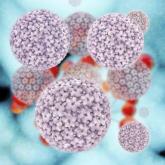News

FROM OBSTETRICS AND GYNECOLOGY
Finally, the ACOG committee noted that, “long-term efficacy of the vaccine remains incompletely established. Although HPV vaccination is an important step toward cervical cancer prevention, it does not remove the need for routine cervical cancer screening.”
After age 65 years, screening can be discontinued for women with who have had consecutive negative testing in the prior 10 years. For women who have had grade 2 or 3 cervical intraepithelial neoplasia (CIN), or adenocarcinoma in situ, screening needs to continue for 20 years after spontaneous regression or treatment.
“Women aged 65 years and older do get cervical cancer,” the ACOG committee members wrote. “Women in this age group represent 14% of the U.S. female population but have 19.6% of the new cases of cervical cancer.”
However, since most cases occur in inadequately or unscreened women, and because of the long latency of HPV-driven cancers, “screening women in this age group would prevent very few cases ... [and the slight gain] would come at significant cost, including an increase in required colposcopy procedures.”
Changes in most risk factors, including new sexual partners, are not a reason to start screening again in older women because of the long disease latency, according to the ACOG recommendations. Dr. Rabin added, “I reconsider this in certain instances if their status changes, especially if there is immunosuppression, being with a high-risk partner, or having multiple sexual partners.” *
The guidelines recommend more frequent screening for women previously treated for CIN 2, CIN 3, or cancer; those with HIV infection; those who are immunocompromised, including have received solid organ transplants; and those who were exposed to diethylstilbestrol in utero.
Women who’ve had a total hysterectomy and no history of CIN 2 or greater don’t need screening, but those who have had a high-grade CIN should continue it, as there can be a recurrence in the vaginal cuff even years later.
*Clarification, 1/8/2016: An earlier version of this story misstated Dr. Jill Rabin's position on when to screen women age 65 and older.

